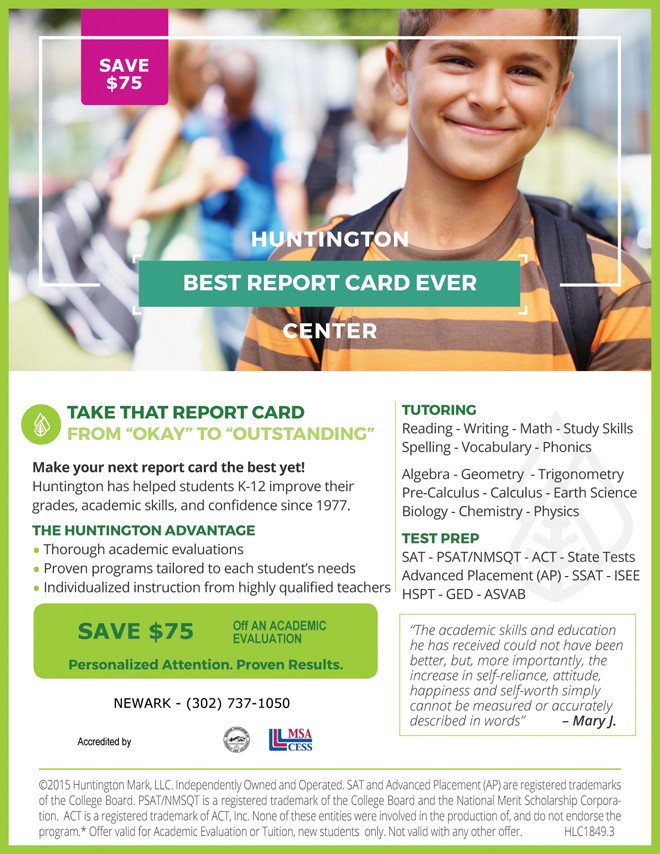Finding the Right Homework Routine
 Presented By Jim Power
Presented By Jim Power
Article By Dr. Raymond J Huntington, Co-Founder of Huntington Learning Center
Arguably one of the most essential traits that your child can acquire throughout his or her education is good organization. Embracing strong organizational habits and a daily routines can help your child make the most of homework time and avoid wasting time.
Similarly, a consistent homework routine helps children become self-sufficient students and inspires them to take responsibility. Routine gives students a purpose, thereby encouraging them to approach learning new skills and concepts
with confidence.
While routine is important for students to thrive, what works for one child might not work for another. Here are a few tips for parents to help their child find the right homework routine:
• Some children need an after-school break.
Many parents assume the best approach to homework — especially for younger children who may not have many after-school extracurricular activities — is for children to dive in the moment they get home from school. However, this may not work for every child. Some children do much better when they decompress for 30 minutes before getting started on homework.
• Other children do their best work while still in “school mode”.
On the other hand, some students find that a break before dinner time only distracts them. On days that your child does not have sports practice or activities after school, he or she may prefer to get homework completed right away.
• Children who tend to procrastinate need help with prioritization.
While your goal should be to help your child become an independent studier, you can help him or her learn how to develop a daily homework to-do list that minimizes downtime. If your child tends to spin his or her wheels when it comes to homework, spend five minutes together before he or she gets started to develop a game plan and estimated amount of time for each item on the to-do list.
• Short study sessions are better than homework marathons.
Much has been documented about the benefit of frequent, abbreviated study sessions. Not only do shorter study periods encourage students to repeatedly review concepts, it is far easier for students to stay focused for brief periods of time. It is ok if your child only has 15 minutes after school to get some homework in and needs to resume later on, that’s okay. Breaking up the study sessions may actually be a good thing for his or her retention.
• Try alternating.
Encourage your child to break down larger, more complex assignments rather than try to knock them out in one sitting.
If your child is writing a paper, for example, have him or her write a few pages, then turn his or her attention to another subject.
• Small goals and incentives can be helpful.
No matter the age of your child, it’s always helpful to have goals to work toward. Once your child finishes one subject, he or she should reward him or herself with a five-minute break to text back a friend or step outside for some fresh air. When your child completes all of his or her homework, allow some free time to do whatever he or she wants — television or computer time, for example.
When you approach the homework routine, keep in mind that consistency is the key. Once your child embraces homework and studying as a daily habit, he or she will become more proficient at managing his or her time effectively — in school and in life.
About Huntington
Huntington is the tutoring and test prep leader. Its certified tutors provide individualized instruction in reading, phonics, writing, study skills, elementary and middle school math, algebra through calculus, chemistry, and other sciences. It preps for the SAT and ACT, as well as state and standardized exams. Huntington programs develop the skills, confidence, and motivation to help students succeed and meet the needs of Common Core State Standards. Founded in 1977, Huntington’s mission is to give every student the best education possible.
Learn how Huntington can help at www.huntingtonhelps.com.
*SAT and Advanced Placement (AP) are registered trademarks of the College Board. PSAT/NMSQT is a registered trademark of the College Board and the National Merit Scholarship Corporation. ACT is a registered trademark of ACT, Inc.
Dr. Raymond J. Huntington is co-founder of Huntington Learning Center, which has helped children achieve success in school for over 35 years. For more information about how Huntington can help your child, call 1-800-CAN-LEARN.
Jim Power is the Executive Director of the Huntington Learning Center in Newark, 34 Liberty Plaza, Kirkwood Highway, Newark, DE 19711. For more information or to schedule a consultation at the Newark location call 302-737-1150 or visit www.newark.huntingtonlearning.com.





